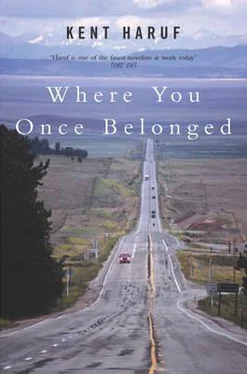Kent Haruf - Where You Once Belonged
Здесь есть возможность читать онлайн «Kent Haruf - Where You Once Belonged» весь текст электронной книги совершенно бесплатно (целиком полную версию без сокращений). В некоторых случаях можно слушать аудио, скачать через торрент в формате fb2 и присутствует краткое содержание. Год выпуска: 2004, Издательство: Pan MacMillan, Жанр: Современная проза, на английском языке. Описание произведения, (предисловие) а так же отзывы посетителей доступны на портале библиотеки ЛибКат.
- Название:Where You Once Belonged
- Автор:
- Издательство:Pan MacMillan
- Жанр:
- Год:2004
- ISBN:нет данных
- Рейтинг книги:5 / 5. Голосов: 1
-
Избранное:Добавить в избранное
- Отзывы:
-
Ваша оценка:
- 100
- 1
- 2
- 3
- 4
- 5
Where You Once Belonged: краткое содержание, описание и аннотация
Предлагаем к чтению аннотацию, описание, краткое содержание или предисловие (зависит от того, что написал сам автор книги «Where You Once Belonged»). Если вы не нашли необходимую информацию о книге — напишите в комментариях, мы постараемся отыскать её.
Where You Once Belonged — читать онлайн бесплатно полную книгу (весь текст) целиком
Ниже представлен текст книги, разбитый по страницам. Система сохранения места последней прочитанной страницы, позволяет с удобством читать онлайн бесплатно книгу «Where You Once Belonged», без необходимости каждый раз заново искать на чём Вы остановились. Поставьте закладку, и сможете в любой момент перейти на страницу, на которой закончили чтение.
Интервал:
Закладка:
So we had that in common that summer after graduation: we were both going to college at Boulder. It served as another bond between us. Whenever we met during the summer we talked about college and explained to one another just what kind of splash we intended to make. When we got there, though, it didn’t turn out quite the way we intended: one of us sank and the other barely made a ripple. Boulder was a deeper pond than a couple of boys from Holt County had anticipated.
4
But it was all right in the beginning. He was a big rawboned kid and when he showed up for football practice in the middle of August he was sufficiently violent to please the coaches. Still it must have been obvious that he wasn’t a college-level running back. He was big but he was too slow. So in the second or third week of practice the coaches moved him into the line. That way he could use his strength and aggressiveness and not have to think too much. But he missed the glory. In high school he had carried the ball himself and had had his name featured prominently in the local papers. Now he was a defensive tackle and while he was still pretty good, everyone in college was good; so he wasn’t singled out for special attention.
Then school started. I had arrived by that time myself. I had moved into the dorm with another freshman, a scrawny red-haired kid from Chicago named Stewart Fliegelman. I had never met anyone like Fliegelman before. As soon as I’d unpacked my bags he announced that he had come out West as a missionary, to spread the gospel according to Marx. He was full of that kind of youthful enthusiasm. But I enjoyed him a great deal, and the truth is I still miss him. He’s a lawyer now in Oak Park, working on a second marriage with two sets of kids to provide for, but about twice a year I call him up and we talk on the phone.
As a roommate Fliegelman was lively, opinionated, verbal, well-read, studious, disorganized, bighearted and politically radical. He used to say that my beliefs were quaint, that whatever charm I had was the direct result of my universal ignorance. Whenever he said such things I told him to go to hell. I told him that coming from Chicago he wouldn’t know the difference between bullshit and chocolate pie even if he stepped in it. Then he would jump me and we’d wrestle in the room. By the end of that first semester we were close friends and during the four years that I knew him in Boulder I learned as much from him as I did from anyone else in the world. I’d never tell him that, though. He’d say that I was getting sloppy again. He’d say: “Arbuckle, for once in your life try not to confuse opinion with facts. You’re supposed to be a journalist, for Chrissakes.”
And so I am. Or at least I try to be. And the IRS, for their part, think so too: they continue to accept my claim to be a newspaperman without ever demanding to see the actual product. Besides, I keep a framed diploma hanging on the wall above my desk to further substantiate my claim. The diploma’s been there for more than twenty years. It’s dust-coated and spider-webbed now and the paint behind it is darker than the rest. Because, in the end, after four years of college, I came home again. It was my father’s idea; he wanted me to help run the paper and eventually to take it over. At the time it sounded like a good thing to do. And so I’ve been here ever since, for twenty years and more, trying once a week to get out a small-town newspaper for the edification and entertainment of the local populace, if not for the profit and remuneration of its editor and publisher: the Holt Mercury .
But that was later. In the fall of 1960 I was in college. And so was Jack Burdette. For a while yet.
After I’d arrived in Boulder and moved into the dorm I’d still see him occasionally. He’d be on campus with some of the others, big muscular kids wearing athletic tee shirts, filling up the sidewalk coming toward you or occupying a table with some of those good-looking long-legged sorority girls, all of them loud and joking, in the University Memorial Center. But I didn’t see him very often and we didn’t have much to do with one another then.
He was living in Baker, one of the other dormitories. It was like all of the buildings at the university, constructed of flagstone and brick and red tile. For it was a pretty campus, one of the most beautiful in all of this Rocky Mountain region, with the abrupt sides of the Flatirons standing up at the start of the mountains just above town, and on the campus itself the big trees and the old evergreens and all the red-tiled buildings, with still sufficient space between them so that you didn’t feel stifled or closed in by the mass of stone or the press of trees. It was a good place for someone like me to be. Boulder — and living with Fliegelman — opened my eyes.
But none of that was true for Jack. He wasn’t there long enough. Not that he would have allowed his vision to have been changed appreciably even if he had been. But he didn’t get the chance. Within a month after school started he got into trouble. The trouble had to do with a radio.
I first heard about it — or knew about it, that is — when I saw the article in the Colorado Daily . They ran it in a little box on the second page. The article said that another freshman named Curtis Harris had brought charges against Jack and that the student judiciary would convene on Friday to hear the case. The article appeared on Tuesday morning. After reading it I went over to Baker to see if I could find Jack in his dorm room. His roommate, another football player, said he didn’t know where Jack was; he was probably watching TV.
“But doesn’t he have classes?” I said. “It’s the middle of the morning.”
“What classes?” he said. “Jack doesn’t go to classes.”
“You mean today?”
“I mean any day. He hasn’t been to a class in three weeks. He’s going to get in trouble.”
“He’s already in trouble,” I said.
The guy studied me for a moment. “What’s that to you? You know him, or something?”
“I know him,” I said. “And they should have given Wanda Jo Evans a scholarship too if they expected Jack to go to class.”
“Who’s she?”
“You wouldn’t know her.”
“I know some girls.”
“But you wouldn’t know her. Anyway where’s this TV Jack might be watching?”
“Downstairs. Only I don’t know if he’s even there. I’m not his keeper.”
“I’ll go see if I can find him,” I said.
I went back downstairs.
After looking around for a few minutes I found Jack in one of the rooms next to the dormitory lounge. The door was shut. He was the only person in the room and he was lying on a sofa in his blue jeans and gray tee shirt. He was watching a game show on the black-and-white television and his feet were sticking out over the end of the sofa. When I sat down near him he looked over at me and then turned back to the TV.
“Jack,” I said. “How’s it going?”
“I can’t complain.”
“That’s good,” I said. “But what do you think will happen?”
“About what?”
“About this radio you took.”
“How’d you hear about that? You been talking to somebody?”
“It was in the student paper this morning. I came over to see what you’re going to do about it.”
“What the hell is there to do about it?”
“Well. The paper said somebody named Curtis Harris filed charges against you. That you stole his radio.”
“That’s a lie. Hell, he wasn’t using it so I just borrowed it for a while. And then I didn’t give it back to him yet.”
“Are you going to?”
“Not now.”
“How come?”
“Because. I don’t have it no more. The police have it. They took it for evidence.”
Читать дальшеИнтервал:
Закладка:
Похожие книги на «Where You Once Belonged»
Представляем Вашему вниманию похожие книги на «Where You Once Belonged» списком для выбора. Мы отобрали схожую по названию и смыслу литературу в надежде предоставить читателям больше вариантов отыскать новые, интересные, ещё непрочитанные произведения.
Обсуждение, отзывы о книге «Where You Once Belonged» и просто собственные мнения читателей. Оставьте ваши комментарии, напишите, что Вы думаете о произведении, его смысле или главных героях. Укажите что конкретно понравилось, а что нет, и почему Вы так считаете.












